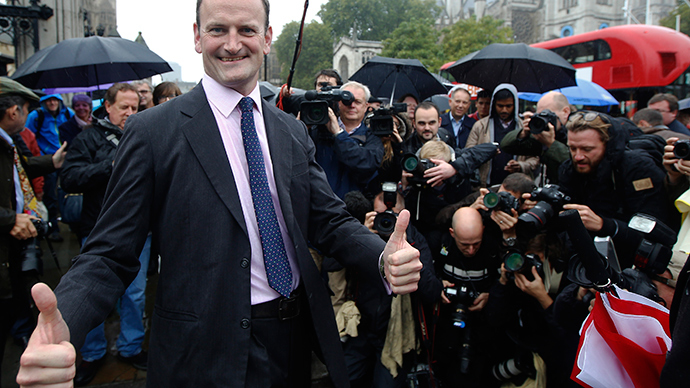UKIP and fringe politics don't signal end of democracy: Neo-conservatism in UK and US did that

Last week, in a shock result, the United Kingdom Independence Party or UKIP won their first seat in the British parliament.
Many think that within the context of a shift in European politics and perhaps globally to the right, this tells us something new. The truth is that just as we have seen in the United States, the two party system pretty well morphs into a one party system, all advocating the same policies. The same can be said of the UK.
There is no real difference between Republicans and Democrats, or the Labour party and Conservatives. All have become bedrocks of neo-conservatism, supporting war for profit, and have supported banker bailouts over public services. The election of UKIP's first MP, with the very real possibility of them gaining more seats at the next general election, doesn't change that.
UKIP are a symptom of a wider problem, not the cause of it. The fact that UKIP’s leader Nigel Farage, models himself as being anti-establishment when in reality he is the absolute embodiment of it, just adds to the overall absurdity of politics as it stands. It would all make great satire, unbelievable as it all is, if it wasn't all sadly reality.
And this is not something unique to the UK. The so-called liberal party in the US, the Democrats, following eight years of Republicanism under George Bush, took office, only to further the aims of the neo-conservatives. More bombs, more drones, more prisons, and more war.
The goal posts and lines have shifted in politics both in Britain and in the US, leaving voters angry, confused, and unsure who to turn to. Often this has led to mass demonstrations and protests. All of this provides a fertile breeding ground for fascism, and makes recruitment for the likes of right-wing parties easier.
The financial centers of the US and UK caused the economic meltdown of 2008, and ultimately, that is why there is perhaps now, little difference between any of the political parties in both nations. The effect of unbridled lobbying and corruption has taken its toll.
Politicians of all stripes have bought into and still believe in the old model of capitalism. Broadly speaking, they all support war, privatization and big business. UKIP's main selling point to the masses and their supporters is their position on the EU. But who knows if they'd stick to this if they had a sniff of real power?
To be fair though, so far, UKIP has been more consistent than the Liberal Democrats. UKIP are unashamedly anti-immigration and have stuck to it. In 2010, by contrast, the Liberal Democrats only succeeded in gaining power because their campaign appealed largely to UK students who believed the Lib Dems would abolish tuition fees. In the end they sold out before the ink had dried on their election promise pledge, and the Liberal Democrats instead supported the trebling of tuition fees.

Perhaps one can draw a parallel between Nick Clegg and Barack Obama here. Both campaigned on the basis of “change” and of being different. Both became figure heads for the very politics they claimed to provide an antidote to.
So what makes people think that UKIP or any of these other types of pseudo-political ideologies would be any different to what we've seen? If anything, they further bolster the notion that there is significant difference between government policy and opposition. There isn't. In fact, with all the hyperbole surrounding UKIP, they probably make the Conservative and Labour parties seem marginally less right-wing than they are. That in itself could present a danger.
It wouldn't be hard. But don't fall for it. But as much as I personally dislike the politics of UKIP, it was not UKIP that dragged us into the problems we now face.
I fear that UKIP more than a danger, is a distraction from the real danger we face from government. Their election doesn't signal the death of politics. UKIP is a direct result and symptom of the policies of austerity being pushed through by the government. These are the policies which if anything, have signaled that death. Rather than being viewed as the result of the problem, UKIP provides a convenient bogey man for many on the left. At the same time it creates one for many on the right, who happily join UKIP in pointing the finger at anyone they don't like, mainly immigrants and the most vulnerable in society.
UKIP's election however doesn't signal a dramatic milestone in politics. The election win has ultimately happened due to the failure of the other parties to represent the people they are supposed to serve.
All of the mainstream political parties support right wing policies plain and simple and UKIP are no different.
Ironically, supporters model themselves as a credible alternative opposition to whatever the order of the day is.
Just as in the US, when the democrats presented what many believed was a serious alternative in 2008, to the failed policies of George Bush, the same can be said of both UKIP, and also the opposition to government in the UK, Labour.
My worry though, is that just as is seen in the United States, the rise of parties like UKIP will simply legitimize racism. At the same time, they themselves will become the vocal point of anger and attention. UKIP and other right-wingers have gained credibility due to the utter failure of the political class both here and in the US.
It's that failure that needs to be focused on, not the emergence of fringe parties. If politicians truly represented the interests of the people, charlatans and political demagogues would fade into insignificance. But when the main parties become so stale and look pretty much the same, it makes anything seem more credible to voters.
It says something that UKIP have had some great coverage from Fox News in the US. Like so much else they are by design or default a smokescreen, but one senses more and more people are arriving to a similar conclusion and are realizing it’s the system that's broken. Until it’s fixed there won't be much difference between politicians of any persuasion.
The statements, views and opinions expressed in this column are solely those of the author and do not necessarily represent those of RT.
The statements, views and opinions expressed in this column are solely those of the author and do not necessarily represent those of RT.













